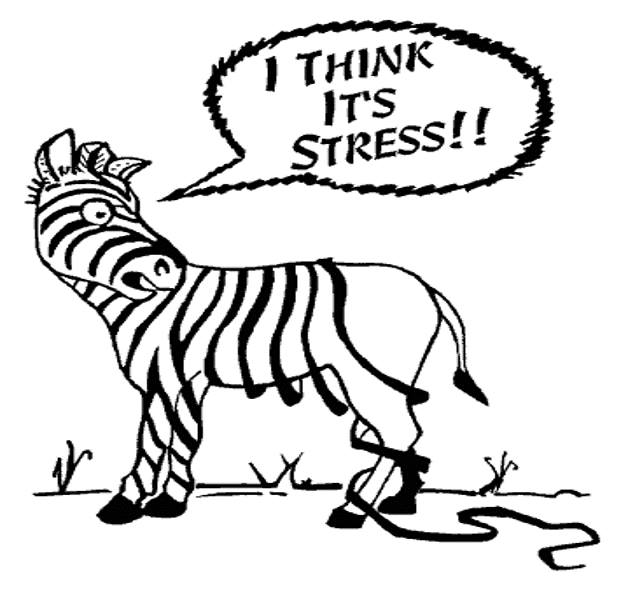Stress’- A word that describes all the problems of a person with a sigh!
Being in stress has become a common phenomenon now in both adults and children. Feeling stressed is completely normal but the way we have perceived it’s meaning has always made us think in the negative way denying its positive attributes.
But did you know?
According to experts, ‘stress is a burst of energy that basically advises you on what to do. In small doses, stress has many advantages. For instance, stress can help you meet daily challenges and motivates you to reach your goals. In fact, stress can help you accomplish tasks more efficiently. It can even boost memory.’
While stress is a normal reaction to challenges, understanding how it affects both your mind and body can improve emotional wellbeing, resilience, and overall focus in life.
Stress is also a vibrant warning system, producing a fight-or-flight response. When the brain perceives some kind of stress, it starts flooding the body with chemicals like epinephrine, norepinephrine, and cortisol. This creates a variety of reactions such as an increase in blood pressure and heart rate. Plus, the senses suddenly have a laser-like focus so you can avoid physically stressful situations — such as jumping away from a moving car — and be safe.”
While we have traditionally considered stress harmful to our health, a new understanding has turned things upside down.

Table of Contents
ToggleBenefits of Stress
There are various health benefits with a little bit of stress. Stanfort.edu mentions that researchers believe that some stress can help to fortify the immune system.
For instance, stress can improve how your heart works and protect your body from infection.
In one study, individuals who experienced moderate levels of stress before surgery were able to recover faster than individuals who had low or high levels.
The right levels of stress can dramatically fortify your ability to fight infection, prevent cancer, and live longer.
Stress is the trash of modern life – we all generate it but if you don’t dispose of it properly, it will pile up and overtake your life – Danzae Pace
Let me tell you a story…
One day, a psychology professor entered the classroom with half a glass of water in his hand. As she raised the glass of water the students expected the old common question “was it half empty or half full?” But to their surprise, he asked them “How heavy is this glass of water I’m holding?”
The answers ranged from eight ounces to couple pounds. Then the professor replied ‘the actual weight of the glass with water doesn’t always matter but how long you hold the glass is what matters.’
‘If I hold the glass for a minute, I won’t feel much weight. But if I hold it for 10 minutes, I will feel a little more weight and it will get heavier for me with hours.
’ ‘If I hold it for the entire day, my hands would go numb and paralyzed forcing me to drop the glass. Similar is the case when you carry stress with you. If you think about it for a while nothing happens; the problem arises when you think about it for hours and hours and just don’t let go.’
“Stress – the confusion created when one’s mind overrides the body basic desire to choke the living daylights out of somebody who desperately needs it.’’
In medical or biological context stress is a physical, mental, or emotional factor that causes bodily or mental tension. Stresses can be external (from the environment, psychological, or social situations) or internal (illness, or from a medical procedure).

What are the Sources of Stress
Big stressors include money troubles, job issues, relationship conflicts, and major life changes, such as the loss of a loved one.
Smaller stressors, such as long daily commutes and rushed mornings, can also add up over time.
Some of the behavioral signs that you’re stressed are:
- Depression or anxiety, irritability
- Frequent colds and infections
- Problems with your memory and concentration
- Insomnia
- Increased use of drugs, alcohol, and cigarettes
- Procrastinating and avoiding responsibilities
Chronic stress, or a constant stress experienced over a prolonged period of time, can contribute to long-term problems for heart and blood vessels. The consistent and ongoing increase in heart rate, and the elevated levels of stress hormones and of blood pressure, can take a toll on the body.
According to a recent survey:
The ‘2018 Cigna 360 Well-Being Survey – Future Assured’, conducted by Cigna TTK Health Insurance, show that
- stress levels are higher in Indian compared with other developed and emerging countries, including the United States, the UK, Germany, France, China, Brazil and Indonesia.
- Females reported significantly higher levels of stress than males (60% vs. 41%).
- Over 50% of people from India said they are not spending sufficient time with friends or have enough time for hobbies.
- The dip in family well-being is mostly due to growing concerns about the ability to financially support parents and children.
- With 65 % of U.S. employees citing work as a significant source of stress and more than one-third reporting chronic work stress, workplace stress can affect both individual well-being and organizational performance.
Recognizing stress patterns is also closely tied to relationship clarity and emotional awareness, as stress in personal connections can affect communication and wellbeing.

How can You Make Your Stress Positive
First of all, we need to accept that stress is part of life. We just have to keep our problems in proper perspective. If something is bothering you too much just share it with somebody like your parents, friends, or spouse. Every cloud has a silver lining so look for the positive aspects.
Here are some tips to help you relieve stress.
- Try to keep a positive attitude.
- Learn to be assertive instead of aggressive.
- Practice relaxation techniques; try meditation, yoga, or tai-chi for stress management.
- Exercise is one of the most important things you can do to combat stress. So, keep exercising! Look for stress buster games or toys.
- Eat healthy, well-balanced meals.
- Find a place to comfortably sit or lie down, and close your eyes if you can.
- Spend the first minute being aware of your body and getting comfortable.
- Notice the physiology of the stress response in your body.
- Say to yourself there is a positive side to stress.
- Laughing helps to reduce heart diseases, improves breathing, decreases stress, and makes you look young.
- Try to be happy always, happiness is your personal decision.
‘If you don’t feel it, flee from it. Go where you are celebrated not merely tolerated’.
Many people also find that tools that support mental wellbeing and focus — like free mental health apps — can be helpful alongside other stress management strategies.
Ways to Relieve Stress in Daily Life
Relieving stress does not require drastic changes or complex routines. Small, consistent actions often have the strongest impact on how the body and mind respond to pressure. When practiced regularly, these habits help prevent stress from becoming overwhelming or chronic.
Some effective ways to relieve stress include:
Deep breathing and mindful pauses
Slowing the breath helps calm the nervous system and reduces the body’s stress response. Even a few minutes of focused breathing can improve emotional balance.Physical movement and light exercise
Activities such as walking, stretching, or yoga release built-up tension and support mental clarity by improving blood flow and reducing cortisol levels.Structured routines and planning
Organizing tasks and breaking them into manageable steps can reduce mental overload and improve focus, especially during busy or demanding days.Limiting overstimulation
Reducing excessive screen time, notifications, or background noise allows the brain to recover and process stress more effectively.Self-reflection and awareness
Taking time to notice emotional triggers helps identify patterns that contribute to stress, making it easier to respond thoughtfully rather than react impulsively.
Difficulty staying focused is often a stress response rather than a lack of ability. Learn how to improve focus and concentration naturally using simple daily habits that support mental clarity, reduce stress, and improve productivity without medication.
These approaches work best when combined and practiced consistently rather than used only during moments of high stress.
Conclusion
Stress is a natural part of life and cannot be eliminated completely. However, changing how stress is understood and managed can make a significant difference in overall wellbeing. When viewed as a signal rather than a threat, stress can encourage growth, focus, and emotional awareness.
By developing healthy coping strategies and recognizing personal stress patterns, it becomes easier to maintain balance during challenging situations. Managing stress effectively is not about avoiding pressure, but about responding with clarity, resilience, and self-understanding.
With consistent practice and awareness, stress can become a tool for personal development rather than a barrier to wellbeing.
Heightened awareness and reflection often show up during moments of stress, similar to how people explore deeper patterns like angel numbers for personal clarity and direction.
FAQs on Stress
What are the best ways to manage stress in daily life?
Stress can be managed with daily habits like mindful breathing, physical activity, time management, and activities that promote relaxation and resilience.
Can stress ever be beneficial?
Positive stress, or eustress, can boost motivation and focus when managed well, as long as it doesn’t become chronic.
How does stress affect emotional wellbeing?
Stress impacts both physical and emotional wellbeing; learning to recognize and address stress patterns can improve overall clarity and mental balance.
Is stress management linked to better focus?
Yes, relieving stress and practicing focus techniques can improve cognitive function, productivity, and decision-making.
When should I seek help for stress?
If stress persists, significantly affects daily functioning, or brings anxiety symptoms, seeking support from a professional can be valuable.
Suggested Read: Top 20 Stress Busters to become tension free

